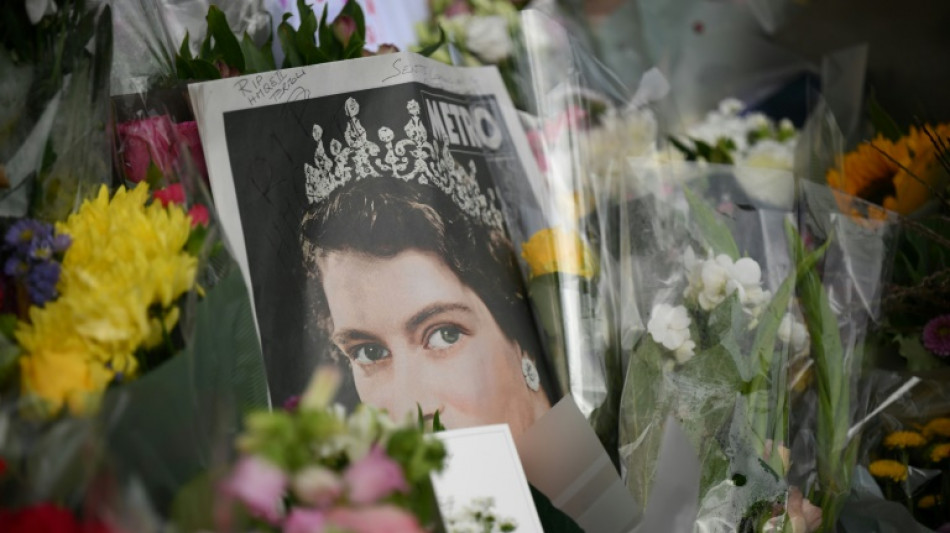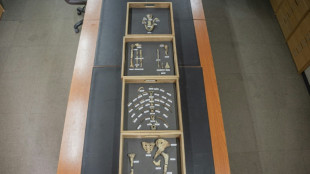

Death of Queen Elizabeth II: What happens next?
The death of Queen Elizabeth II sets in motion a finely choreographed plan honed and planned to the last detail over decades.
Full details are yet to be confirmed but here is what we know so far about how the coming days will unfold.
- Friday, September 9 -
The new King and Queen Consort -- Charles and Camilla -- return to London.
The queen's coffin draped in the Royal Standard flag is expected to remain at her Scottish estate, Balmoral, where she died for a few days.
King Charles III will make his inaugural address to the nation as king on television on Friday evening.
Gun salutes will be fired in Hyde Park and at the Tower of London at 1:00 pm (1200 GMT).
The new monarch will hold his first audience with Prime Minister Liz Truss.
Church bells will toll across the country, with churches, chapels and cathedrals encouraged by the Church of England to open for prayers or a special service for mourners.
The prime minister and senior ministers will attend a public service of remembrance at St Paul's Cathedral.
An online book of condolence has been opened for members of the public to leave messages.
- Saturday, September 10 -
Day 1: The 10-day plan for the days after the queen's death begins with the Accession Council convening for Charles to be formally proclaimed king.
Three trumpeters announce the proclamation with a fanfare. The proclamation is read out from a balcony at St James's Palace in London, then across the country.
Charles will hold audiences, and the media will be briefed by the Earl Marshal, a high-ranking royal official in charge of the accession and the queen's state funeral, in the coming days.
- Sunday, September 11-
Day 2: The queen's coffin is expected to be transported from Balmoral to the Palace of Holyroodhouse, her official Scottish residence in Edinburgh.
The journey by road will pass through many small towns and villages, giving members of the public their first chance to pay their respects.
Preparations for the queen's death in Scotland are codenamed "Operation Unicorn" after the country's national animal.
- Monday, September 12 -
Day 3: Charles is expected to begin a tour of England, Scotland, Wales and Northern Ireland, the four nations of the United Kingdom in an operation codenamed "Spring Tide".
The queen's coffin is expected to be taken in a procession up Edinburgh's Royal Mile from Holyrood to St Giles' Cathedral, where there will be a service and a vigil attended by royal family members.
- Tuesday, September 13 -
Day 4: The coffin is expected to be flown to the capital and transported by road to Buckingham Palace in London.
Members of the public will likely line the route.
- Wednesday, September 14 -
Day 5: A ceremonial procession of the coffin through London is expected followed by a lying in state in parliament's Westminster Hall, codenamed "Operation Feather".
Senior members of the royal family are expected to stand guard around the coffin in a tradition known as the Vigil of the Princes.
- September 15-17 -
Days 6,7 and 8: Lying in state. Public can pay their respects, filing past the coffin on its catafalque.
- Sunday, September 18 -
Day 9: A reception to be held for visiting dignitaries and heads of state who have arrived for the funeral.
- Monday, September 19 -
Day 10: The state funeral is expected to take place in Westminster Abbey with huge crowds gathering in central London.
Afterwards, the queen's coffin will be taken to Windsor Castle for a televised committal service at St George's Chapel.
She will then be interred privately at the King George VI memorial chapel, alongside her husband, Prince Philip, the ashes of her sister Princess Margaret, their mother, also called Elizabeth, and father George VI.
R.Verbruggen--JdB



